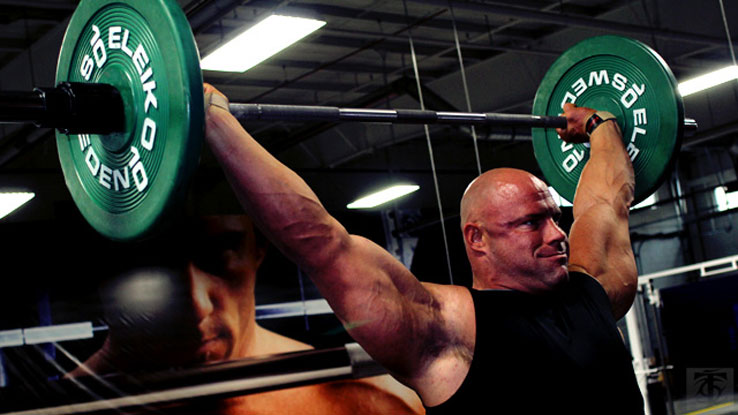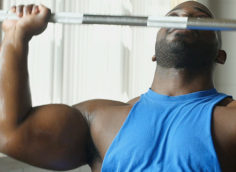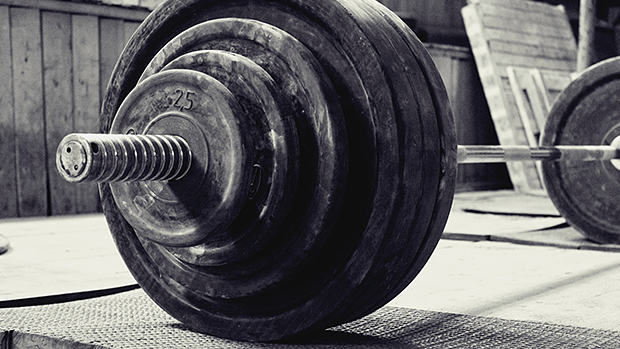For several reasons, most of the articles and books I write are intended for people just starting their training. First, there are more of you, because most people never get past the novice phase of training due to laziness, lack of time, or a change in interests.
Second, novices who read articles on the Internet are better consumers of information than more advanced lifters, because they're actively trying to learn. And third, advanced guys already know everything there is to know anyway – certainly more than Rippetoe does.
This article is no different, so if you already know everything there is to know about training and, in this particular instance, conditioning, please don't waste your time reading another paragraph.
Now that adequate bandwidth has been restored, here's a shocking statement that applies to all novice lifters, as well as the vast majority of all trainees: training specifically for conditioning without a well-developed strength base is a waste of time.
There's simply no better way to increase your work capacity than increasing your ability to produce force. If your primary interest is being more effective at moving yourself and/or submaximal or maximal loads more efficiently, training for strength contributes much more to your goal than training for endurance.
The reason for this should be obvious. Maximal loads are your 1RMs in the basic lifts. For a 200-pound male of average height, a 1.75x bodyweight squat, a 2x bodyweight deadlift, and a .75x bodyweight press constitute a well-developed strength base.
Although this isn't considered "strong" by competitive lifters, it represents a level of strength that's attainable by 95% of male trainees in a few short months of reasonably efficient training on the lifts. More importantly, it makes commonly encountered submaximal tasks much easier repetitively, and this is what we mean by "work capacity."
All in a Day's Work
Loading hay on a trailer all day is a pretty good example of "work." Around here, 70-pound bales are the norm, and 200 of them are a typical afternoon's work. If you can power clean 200 pounds, lifting 75 - 200-pound bales of hay isn't the task it would be for a skinny runner that doesn't lift weights and therefore has a 65-pound clean.

His 30-minute 5-mile time is irrelevant because loading 200 bales of hay is only an endurance task to a guy that's strong enough to actually perform the work.
So how would you get better at loading 200 bales of hay? One way would be to load 50 bales, wait a couple of days and then load 65 bales, wait a couple more and load 80, and work on up to the full 200. This would produce a quick adaptation to the specific task of loading 200 bales of hay.
Running 5 miles would be an example of a great way to avoid addressing the issue altogether, because moving your bodyweight rapidly down the road isn't the nature of the task.
The best way to adapt your body to the task of loading a couple of hundred 75-pound bales of hay would be to spend some time getting your squat, press, and deadlift up to the aforementioned numbers.
This takes longer, but it prepares you for the task of loading the hay, and it has the much more important benefit of preparing you for any other work-related task you might encounter, not just the hay. Granted, it takes longer than escalating hay loading, but it's a more useful adaptation because it's not as specific.
Strength Rules Them All
This is the most important thing to understand: strength is the most general of all athletic adaptations. All other physical capacities, such as power (a guy with a 400-pound deadlift cleans more than a guy with a 150-pound deadlift), even balance and coordination depend on the production of force within the physical environment. If strength improves, all other capacities improve with it, to varying degrees.
For a person who's not strong, time spent getting stronger returns more improvement in all measures of physical capacity than time spent specifically developing any of the other derivative capacities that so many exercise programs consist of.
This is especially significant when you consider that it just doesn't take very long to substantially increase your strength. Every athlete we've trained for strength who competes in a non-barbell sport reports that strength training has the biggest positive impact on their other abilities (which get trained in sports practice anyway).
As far as the breathing thing is concerned, strength training actually improves VO2max values in previously untrained populations. Granted, just a little, because VO2max, like the standing vertical jump, is one of those physical abilities that doesn't improve much with training. Go ahead, look it up.
For novice athletes, or for recruits with many other things to learn, strength training improves this aspect of fitness as efficiently as conditioning programs that take much more time and produce no useful strength improvement.
This may surprise some of you who think that all people must do conditioning to be fit. And I agree that past a certain point in the development of strength, some Prowler work on a regular basis is beneficial, but remember, we're talking about novices, people with no strength base, and for whom a strength base improves all aspects of performance.
The Prowler is the finest conditioning device ever invented, I assure you. Nothing else approaches its effectiveness. But for these people, barbell training works better. Getting their squat up profoundly affects their Prowler capacity, but pushing the Prowler doesn't have the potential to build strength the way barbell training obviously does. The Prowler interferes with a novice's recovery from strength training, and again, strength is by far the more useful adaptation.
So the Prowler and all other conditioning activities can wait until after the strength base is developed. It only takes a few months to get much stronger, unless you fuck up and interfere with the process by losing sight of the priority.

Strength? Conditioning?
It's also very important to realize the difference between a strength and a conditioning adaptation. Strength improves very quickly at first if a correct program is followed, but soon slows down and ultimately can be developed for many years – it's a long-term adaptation because it requires the construction of new tissue and the restructuring of tissue already in place.
Strength is a very persistent adaptation that doesn't disappear after a layoff. Once a man gets strong, he's always stronger than he was before, even if he quits training, because the long-term adaptations have raised his baseline strength. Getting stronger is "expensive" to your body, and expensive things aren't usually disposed of quickly.
Conditioning, on the other hand, develops very quickly and goes away just as fast, as most of you've already noticed. A young, healthy guy can get in pretty good shape to run in about 2 weeks. Lay off a couple of months and you have to start over from the previous baseline, but it comes back just as quickly.
A conditioning adaptation changes the metabolic environment in the cells without the need for the large-scale tissue remodeling necessary for a strength adaptation. Condition comes on quickly, is easy to maintain, and goes away just as quickly.
At the higher levels of endurance-based competition, cardiac changes occur which are more persistent, but that level of endurance adaptation is useless in any other application, whereas strength is used by active people every single day. A resting heart rate of 48 BPM is very cool, but it's not nearly as useful as a 405-pound deadlift.
So, if conditioning comes on quickly, and is easy to maintain, why would you leave it out, especially if it goes away so fast? And the answer is, because if you're weak, you don't need it as much as you need to be stronger, and time Is money.
A bunch of "cardio" or "met-con" absolutely guts your strength progress, while getting stronger improves your work capacity all by itself. There's time to do your conditioning work later – you're not going to die immediately, and if you do, nobody will talk about your shitty 5-mile time. The very programs that should be preparing young guys to be more useful are instead making them very good at running away, and that's about all.
Extreme Specialization
I, of course, realize that my recommendation goes against the conventional wisdom regarding physical preparation for the sports and jobs typically (and incorrectly) regarded as endurance-based.
Running 26.2 miles in under 3 hours is an endurance activity, without doubt. It requires specialized preparation, and strength training is detrimental to high-level marathon training.
But twenty six 5.5-minute miles represents an extremely specialized activity, the epitome of endurance, the performance of which has absolutely no bearing on the ability to do anything else, and the training for which actually decreases physical capacity for other activities – just like the specialization for powerlifting in the elite levels of the heavier weight classes in the weirder federations that don't judge depth anymore.
Marathon competition itself is highly catabolic and has an exceptionally high mortality risk. Half-marathons are much less dangerous, as of course are 5 mile runs. But running at any distance produces no strength adaptation, while strength training improves the sedentary person's ability to run and do everything else, too. So a rational person would regard strength training as the more beneficial activity.
But we don't. We – meaning we recipients and promoters of the conventional wisdom – regard endurance activity as exercise and strength training as something to "sculpt lean muscle" and soothe vanity.
Exception, Not The Norm
Military PT still consists of running and high-rep bodyweight calisthenics like push-ups and sit-ups. Police and fire academy PT is also based on running, and it's the exceptional program, rather than the norm, that builds a programmed strength increase into their graduation requirements.
Here's an interesting take on training for police work, recently overheard at a state-level training academy:
- Size and strength don't matter; it's all about technique. In the "real world" being too strong prevents good technique, and "will get you killed on the street.
- Big motor skills are things like breathing; small motor skills are things like moving your arm. These techniques will start out being small motor skills but as you practice will become big motor skills.
Priceless, right? Never mind the motor skills gibberish – I just thought it was entertaining, so I left it in – but this assessment of strength is completely assbackwards, one that can't meet any analysis of physical reality, the job, and its physical requirements.

Military/Police/Firefighter work involves a variety of physical abilities, all of which we understand pretty well and are easily able to prepare for. If the individual isn't strong enough, all these tasks will be harder than they are for a stronger individual.
The development of mechanized transport has made the forced-march contingency rare enough that no modern battle has been lost because of a unit-wide endurance deficiency, while many an ass has been kicked because the possessor of that ass was not strong enough.
Policemen the world over rely on cars these days, and it's helpful to be strong enough to deal with a bad guy at the end of the occasional foot-chase, unless you were just going to shoot him anyway.
Firefighters die on the job from heart attacks far more frequently than from any other cause, and there's no better way to have a heart attack than to lack sufficient strength to complete a physical task that would have been easier and over with sooner if you were stronger.
I've worked with a rather large number of military units, policemen, firemen, and other people who have physically demanding jobs. Many hundreds of these people have taken our seminar for the express purpose of learning more about getting stronger. Several articles written by active-duty military guys with combat experience are posted on my website, each with a very active discussion thread.
The unanimous view of all these people is that their strength has a pivotal bearing on their ability to function in the toughest situations they encounter, and that endurance plays a much smaller, if not insignificant, role in any modern shitstorm.
A Better Way
In my opinion, and that of men who've been there and done that, boot camps and academies would better prepare their recruits by instituting a basic barbell strength course in place of all the pointless running and conditioning; by requiring that a reasonable strength standard be met for graduation; and by putting the fat kids on a diet and feeding the hell out of the skinny ones.
At the end of 5 to 6 months of basic strength development and the attainment of the required strength standard, the emphasis would shift to a maintenance strength program combined with some intelligently programmed conditioning.
Remember that the conditioning adaptation comes on quickly and is easy to maintain, so that by the time the class graduates they're both strong and in shape. In every case, the graduate of such a program would be better prepared for his job at the end of 9 months than he is now.
The bottom line is that strength improvement for people who are not already strong is the rising tide that floats all the other ships in the physical performance harbor. In the current situation, time is being wasted on conditioning for novice trainees for whom it's neither necessary nor appropriate, and not nearly enough attention has been paid to getting them stronger.
If you're not strong, stronger is fitter. Stronger is conditioned. If you're a novice, take my advice and don't dilute your strength training with a bunch of sweaty work until it's appropriate – when your initial strength gains slow down.
If you're in charge of training novices, and their proper preparation is actually critical to their duties, their lives, and the lives of others, try my suggestion on a group of them, and then compare that group to your standard-approach recruits.
I dare you.





